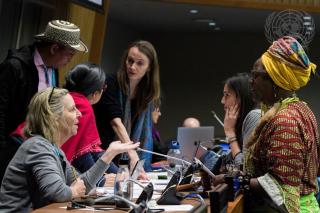
Wednesday (31 August) marked the end of Michele Bachelet's tenure as UN High Commissioner for Human Rights. As we await the outcome of the ongoing selection process for her successor, we asked our friends at the Igarapé Institute what they want to see from next Human Rights Chief.
The next High Commissioner must be an advocate for civil society
Human rights are central to the UN's core mission and activities. The importance of human rights has consolidated over the past 76 years, in particular since the agreement on nine core human rights instruments and the creation of the position of High Commissioner for Human Rights in 1993. The next High Commissioner will surely build on this tradition.
At a time of heightened global tension and polarization, the High Commissioner’s role is more important than ever. The next High Commissioner will need to reassert human rights in settings where core principles and values are threatened. The High Commissioner must be open to dialogue, ensure the promotion of civic space from the international to the national levels and protect the human rights of environmental defenders.
Given threats of authoritarianism and autocracy around the world, the next High Commissioner must strongly advocate for upholding the UN Charter and the Universal Declaration of Human Rights, among other treaties. At the same time, the High Commissioner must also proactively reach out to a wide range of stakeholders to build alliances across states, civil society, and the private sector to ensure human rights and the rule of law. The High Commissioner will need to adopt agile, inclusive and networked approaches to achieve positive outcomes.
In response to global, regional and national challenges posed to human rights, the Igarapé Institute is redoubling efforts to raise awareness about threats posed to civic space and the risks facing all environmental defenders, especially indigenous and minority women in the world’s largest biomes. Shrinking civic space not only threatens individual human rights but also exacerbates social, economic and political tensions. Attacks against environmental defenders not only undermine basic principles of human rights, but also accelerate massive environmental degradation and biodiversity loss.
Research conducted by the Igarapé Institute finds that the systematic erosion of civic space and escalating threats against environmental defenders is undermining progressive goals of the international community - from sustainable development to climate action. These concerns are being recognized by the UN.
Under the leadership of Secretary-General António Guterres and based on his Call to Action on human rights, the UN recently issued a Guidance Note on protecting and promoting civic space. The Igarapé Institute is mapping the closure of civic space across the Americas and hopes that the next High Commissioner will play a key role to advance the promotion of civic space at the international level.
Democratic backsliding is a major threat not just to the principles and values of human rights, but also to the environment and the people protecting it. Environmental defenders, and in particular female advocates, are on the front lines of the fight against the devastation of natural resources and biodiversity.
The Igarapé Institute has found that most women defenders interviewed in Amazon Basin countries reported violence at least once during their lives. The Institute hopes that the next High Commissioner will take up these issues for the sake of both human rights and wider aspirations on which they depend.
The Igarapé Institute is an independent think and do tank, headquartered in Rio de Janeiro, focused on the areas of public, climate and digital security and its consequences for democracy.
Photo: Permanent Forum on Indigenous Issues Continues Human Rights Dialogue. Credit: UN Photo/Manuel Elías






